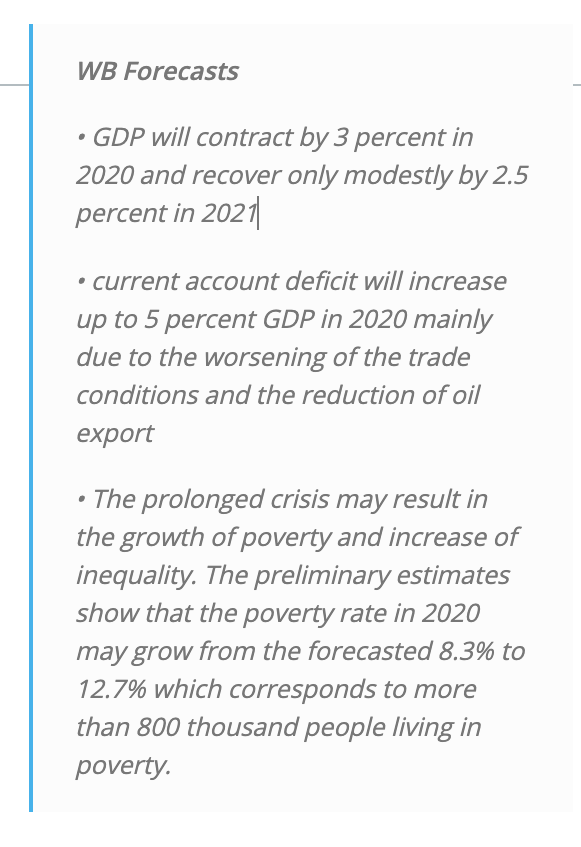For Kazakhstan, the coronavirus pandemic, from an external shock, may turn into a mechanism of internal instability and transform the economic risks into the social and political ones. Such are the general conclusions of the Kazakhstan Economic Update report published by World Bank on July 22.
 This report is published semi-annually. However, this time the usual review analysing latest economic events, mid-term development prospects and macroeconomic policy has turned out to be a truly alarmist* document calling into question Kazakstan’s entire social fabric.
This report is published semi-annually. However, this time the usual review analysing latest economic events, mid-term development prospects and macroeconomic policy has turned out to be a truly alarmist* document calling into question Kazakstan’s entire social fabric.
A Shock to the National Economy
The authors of the report believe that the COVID-19 economic effects have turned out to be the biggest shock that Kazakhstan’s economy has experienced for almost two decades. They are cardinally different from the effects of the two latest shocks, that of 2009 and 2015.
The previous shocks were primarily caused by the drop of the oil prices which led to the reduction of cumulative demand and seriously hurt the financial sector. This time, World Bank believes, it is cumulative supply that has become the victims of the blow since the necessary measures of isolation have led to the reduction of the supply of goods and services – simply because there were no buyers.
Contrary to the factor of demand, the supply factors are harder to restore via fiscal and monetary stimulating measures especially when they are used amid the protracted pandemic and the prolonged global economic recession.
Apart from the economic dimension, the supply shock has a social one. The thing is that, as WB experts note, the sectors oriented towards mineral resources extraction and exporting are much less affected by the COVID-19 impact. And have greater chances for a fast recovery.
 The mid-size and small businesses oriented towards supplying goods and services to end consumers have turned out to be the the main victim of the pandemic since they are having a much harder time finding their place in the new conditions of the “social distancing” economy. However, it is this factor that serves as the major one from the point of view of absorbing the labor force arriving to cities with certain speed determined by the demographic factors.
The mid-size and small businesses oriented towards supplying goods and services to end consumers have turned out to be the the main victim of the pandemic since they are having a much harder time finding their place in the new conditions of the “social distancing” economy. However, it is this factor that serves as the major one from the point of view of absorbing the labor force arriving to cities with certain speed determined by the demographic factors.
Unfortunately, the report contains no mention of the fact that launching any independent business in modern Kazakhstan is quite far from how it usually done today but much closer to the contractual disputes of the medieval times when, to open any shop or manufacture, one had to receive the approval of all the interested parties and agencies.
Therefore, the current crisis may result in an even greater division of the two economies – resource-based economy and people’s economy. In the environment where consumer expenses and investments tied to extraction of mineral resources serve as an important GDP driver, any power (not just the Kazakh authorities that, as a rule, tend to have their own personal interest in the development of the economy’s resource sectors) will have to take its lead from it.
Inequality and the Loss of the Human Capital
This division may result in the growth of poverty and social inequality in Kazakhstan. Based on the preliminary estimates of the report, the poverty rate in 2020 may grow from the forecasted 8.3% to 12.7% which corresponds to more than 800 thousand people living in poverty.
All these people will become hostages of the trap created by the modern system of education. Social inequality finds its expression, among other things, in the unequal opportunities for receiving education – both financial and structural ones. Even without taking into consideration the impact of the COVID-19 global pandemic, Kazakhstan’s system of education is changing for the worse. Based on the results of the international PISA tests conducted in 2018, academic progress of Kazakh students had decreased against the 2012 level and was 100 PISA points below the OECD average.
In other words, an average student in Kazakhstan falls behind their peer in the highly-developed countries by two and a half years of schooling. Obviously, given this state of affairs and the alarming trend, well-off parents will try and seek alternative possibilities to educate their offsprings. Which, in turn, will result in a dramatic decline of the system of education in standard schools that are still accessible for the common citizen.
Already at this point, the results of about two thirds of the PISA tested students are below the limit of functional literacy. In these circumstances, switching to remote teaching that uses online-platforms and television may result in a serious decay of the overall situation with the human capital in the country.
The Recipes for Recovery
The WB experts believe that only redistributing the resources from some state programs for the purpose of increasing access to education and healthcare may change the situation in the country.
In other words, the economy must make a pivot to the people. To do so, it will also have to rely on a greater use of the resources of the private sector that can adapt to the new conditions and react to new possibilities faster.
These (undoubtedly) valid recommendations look extremely out of synch with reality considering the existing political system oriented towards creating and supporting monopolies everywhere, staring from political activities and ending with selling what’s urgently needed.
This kind of monopoly possesses a quasi-state nature in the sense that it acts like one but, in fact, is oriented towards squeezing out a rent for a narrow group of the elite. And, regardless what ideas it preaches, this system will continue serving the interests of this group – till the very last moment of its existence.




